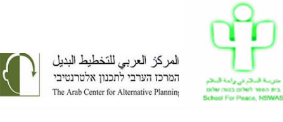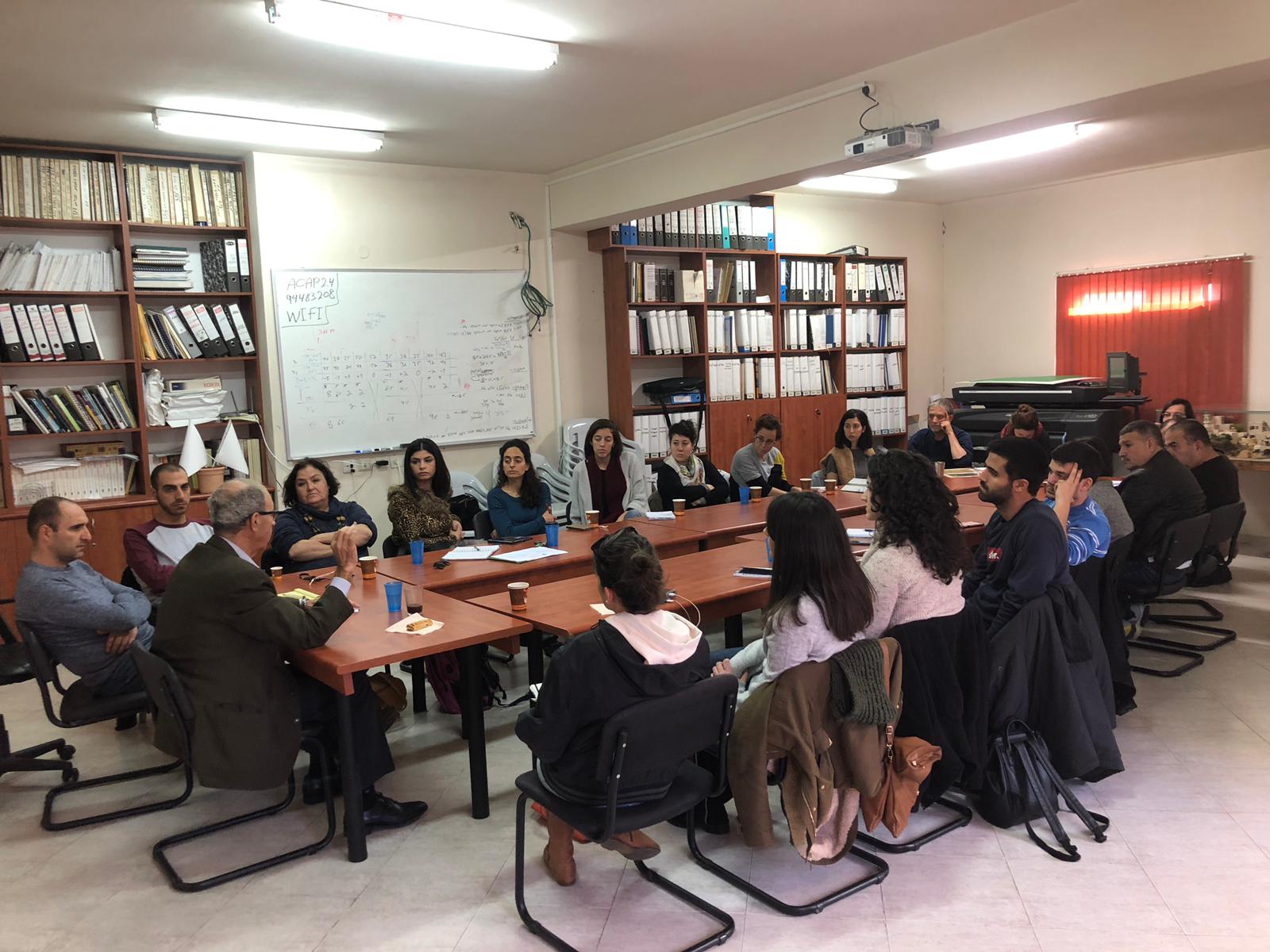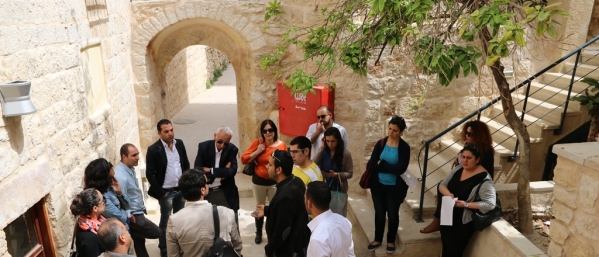Publishing date: 26/09/2018

On November 30 2018, the School for Peace at Neve Shalom-Wahat al-Salam, in partnership with the Arab Center for Alternative Planning (ACAP), launched the 4th year-long course for Arab and Jewish planners and architects. The group has 23 members: 13 Arabs and 10 Jews, 14 women and 9 men.
It is with great pleasure that we welcome the 4th cohort of Change Agent planners and architects, who will join a community of alumni working to achieve equality in the area of planning. After introducing themselves and sharing their expectations for the 2018-2019 course, participants initiated an open dialogue, with Arab attendees raising barbed issues such as the housing crisis in Arab communities and the lack of land for village expansion.
In subsequent sessions, following the program director's suggestions, group members expanded the dialogue beyond planning issues to include other central Arab-Jewish issues in Israel. For example, the group approached the issue of the Nakba as recounted by one of the group members from Eilaboun. In the evening, they watched Rachel Jones’ documentary film “500 Dunams on the Moon” on the establishment of the Ein Hod artists’ village atop the ruins of the Palestinian village of Ein Hod, which was depopulated and destroyed in 1948. The film also follows a group of refugees from Ein Hod as they struggle to re-establish their village. After the screening, participants actively and thoughtfully discussed the film's subject matter.
Among participants, there was a great desire to discuss, listen, and study these problems in depth. The group also tackled the issue of future Arab-Jewish relations in the context of the contemporary legal and social conditions of the state. At the end of the launch day, participants expressed gratitude towards the respectful sharing of new and different perspectives, as well as enthusiasm for what future course meetings have in store.
http://sfpeace.org/%D7%A4%D7%AA%D7%99%D7%97%D7%AA-%D7%94%D7%A7%D7%95%D7%A8%D7%A1-%D7%94%D7%A8%D7%91%D7%99%D7%A2%D7%99-%D7%9C%D7%9E%D7%AA%D7%9B%D7%A0%D7%A0%D7%99%D7%9D-%D7%95%D7%90%D7%93%D7%A8%D7%99%D7%9B%D7%9C%D7%99/
Background:
Over the years, we have seen School of Peace graduates go on to become leaders of Arab-Jewish and Israeli-Palestinian communities. Our graduates work as activists in Israel and Palestine to combat racism, promote human rights, and manage and guide joint projects. We have concluded that the knowledge we have gained is also relevant to other areas of Israeli and Palestinian society. We select areas in which workers can influence the system of relations between the two peoples. In the past, we have established Change Agents programs in different fields: women in the media, doctors, lawyers, teachers/educators, architects, men and women who work in the field of environmental studies, and men and women who work in mental health.
The proposed course for Arab and Jewish urban planners, architects, and civil engineers is held in cooperation with the School for Peace and ACAP in Eilaboun, an organization that helps to develop the tools, knowledge, and professional experience necessary to positively change urban planning policy. These particular professional areas were chosen because of their potential to influence Jewish-Arab relations in Israel. At the core of the conflict are issues of land ownership, planning, and the legitimacy of space. So far, ACAP and the School for Peace have held three year-long courses for city planners, engineers, and architects. In the wake of these successes, we have launched the 4th edition of the program.
Previous graduates have gone on to set up the Arab-Jewish Planning Forum, as well as a working group on urban renewal in Arab towns that submits objections to planning schemes in mixed cities. The group also launched a petition, with more than 300 signatories from relevant fields, regarding the planning of Arab towns and the phenomena of unlicensed homes and house demolitions.
Planning and non-planning can be powerful tools for exercising the majority's control over a minority or an occupied people. In this country, political forces and economic pressure groups are able to influence planning decisions that disproportionately favor privileged groups. Planning must serve the rights of the individual and the group, and take into account the rights to achieve equality, transparency, and the involvement of the public and civil institutions.
The 2018-2019 program will focus on the points of convergence between nationalism and professionalism in relation to the Jewish-Palestinian conflict, the dilemmas that the planner faces when they agree on a map, to plan an area or city. There are a number of considerations at stake: human rights considerations, welfare considerations, economic considerations, political considerations, and national considerations, among others. Combining the great knowledge of the School for Peace on guiding groups in conflict and the professional planning knowledge of ACAP adds a feature to this course.
The year-long course, beginning in July 2018 and concluding in July 2019, consists of 120 hours and will include 24 Jewish and Arab engineers working in planning.
Sessions:
Aworkshop among the planners for the first three sessions, will take place at Neve Shalom-Wahat al-Salam. Through dialogue, participants will have the opportunity to discuss the relationship between Jews and Arabs. A two-day workshop at the end of the course will address planning dilemmas and their connection to Jewish-Arab relations in the state, as well as the dilemmas arising from the conflict between national identity and the professional identity of the planner. The group will also work on projects of their choosing. In addition to holding eight monthly meetings, each six hours in length, there will also be three educational tours.
Meetings will take place alternately at the ACAP office and at Neve Shalom-Wahat al-Salam, on a roughly monthly basis. Each meeting will include a lecture by a specialist, followed by discussions on various issues from the field, focused on paths of cooperation and joint action.

Program details:
Training will be conducted in the spirit of the School for Peace's mission and in accordance with the partnership of ACAP. The training activities are educational and political, aimed at just and humane social change. All of this is accomplished through the development of mechanisms of thinking, exposing the oppressive structures that maintain Jewish-Arab conflict, building a healthy and coherent national identity through interaction with the Other, and enabling participants to understand the reality in which they live and work in order to change it.
Our approach is based on the principle that Jewish-Arab encounter is a meeting between two identities, not just between individuals. The goal is to develop participants' awareness of the conflict and their role in it, to develop critical thinking and to translate visions of action into reality as agents of change. Throughout the program, we will discuss various issues related to national, cultural, social, and political identity, the meeting between identities and the context of action.
The Four Fundamentals guiding our work during the preparation of Change Agents:
1. The visions and beliefs that underlie human identity are fixed and deep, and difficult to change. We try to expose these visions so that we can face them.
2. The conflict underlies the meetings is between two national communities, not between individuals, and we understand these groups as exceeding the number of individuals that comprise them.
3. The group is a microcosm of reality, through which we can learn about society.
4. Group meetings do not exist in a vacuum; they are connected to and influenced by external realities.
Course lectures:
Throughout the year, we will host experts in different fields relating to planning and conflict. The lecturers include Prof. Oren Yiftachel, Prof. Mustafa Kabha, Prof. Gadi Algazi, Prof. As'ad Ghanem, Dr. Hanna Swaid, Dr. Enaya Banna-Jeries, MK Ayman Odeh, Prof. Ayala Roniel, and others.
Tours:
We will hold 3 educational sessions that include tours:
-A tour of East Jerusalem guided by Ir Amim, followed by a lecture with a planning specialist in Jerusalem
-A tour of Wadi Ara guided by Wadi Ara Regional Planning committee engineer, Dr. Enaya Banna-Jeries.
-A tour of a mixed city

Course coordinators: Dr. Nava Sonnenschein and Samer Swaid.
Program Framework:
The first round of workshops will take place at the School for Peace at Neve Shalom-Wahat al-Salam, between July 12-14, 2018. A closing workshop will take place in Al-Buqei'a on July 12 & 13, 2019.
The eight meetings between the opening workshop and the closing workshop are held for meetings once a month on Fridays, each with their own schedules, either in Neve Shalom-Wahat al-Salam or Eilaboun. The course will include 8-hour study tours, and travel will be arranged for all meetings.
Calendar:
July 12-14, 2018: Inaugural workshop at Neve Shalom-Wahat al-Salam.
September 21, 2018: Meeting at ACAP office in Eilaboun.
October 19, 2018: Meeting at School for Peace in Neve Shalom-Wahat al-Salam.
January 11, 2019: Meeting ACAP office in Eilaboun.
February 1, 2019: Meeting at School for Peace in Neve Shalom-Wahat al-Salam.
March 22, 2019: Meeting at ACAP office in Eilaboun.
May 24, 2019: Meeting at School for Peace in Neve Shalom-Wahat al-Salam.
July 12-13, 2019: Closing workshop in Buqei'a.
Requirements:
Participation is mandatory throughout the program, as is working with groups to implement initiatives to change the status quo.
Cost:
The total cost per participant is NIS 1000, which includes hosting and workshops.
.PNG)